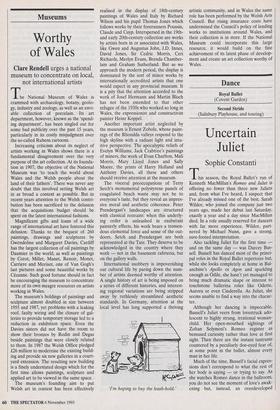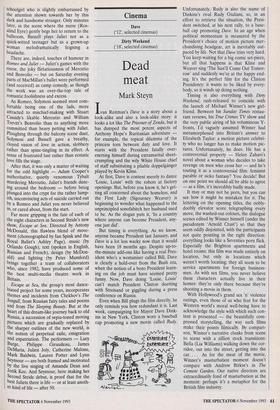Dance
Royal Ballet (Covent Garden) Second Stride (Salisbury Playhouse, and touring)
Uncertain Juliet
Sophie Constanti
This season, the Royal Ballet's run of Kenneth MacMillan's Romeo and Juliet is offering no fewer than three new Juliets and, from what I've heard, I suspect that I've already missed one of the best. Sarah Wildor, who joined the company just two years ago, made her debut last Saturday, exactly a year and a day since MacMillan died. In a role usually reserved for dancers with far more experience, Wildor, part- nered by Michael Nunn, gave a strong, sure-footed interpretation.
Also tackling Juliet for the first time — and on the same day — was Darcey Bus- sell. Busse11 has danced most of the princi- pal roles in the Royal Ballet repertoire but, while she looks completely at home in Bal- anchine's Apollo or Agon and sparkling enough as Odile, she hasn't yet managed to bring much dramatic shape or interest to touchstone ballerina roles like Odette, Aurora or even Cinderella. As Juliet, she seems unable to find a way into the charac- ter.
Although her dancing is impeccable, Bussell's Juliet veers from lovestruck ado- lescent to highly strung, irrational woman- child. Her open-mouthed sightings of Zoltan Solymosi's Romeo register as bemused curiosity rather than love at first sight. Then there are the instant tantrums countered by a peculiarly doe-eyed fear of, at some point in the ballet, almost every man in her life.
Much of the time, Busse11's facial expres- sions don't correspond to what the rest of her body is saying — or trying to say. As she watches Romeo dance in the ballroom, you do not see the moment of love's awak- ening but, instead, an overdeveloped schoolgirl who is slightly embarrassed by the attention shown towards her by this dark and handsome stranger. Only minutes later, in the scene where the nurse (Ros- alind Eyre) gently begs her to return to the ballroom, Bussell plays Juliet not as a quick-witted teenager but as a grown-up woman melodramatically feigning a headache.
There are, indeed, touches of humour in Romeo and Juliet — Juliet's games with the nurse, the joky flirtatiousness of Mercutio and Benvolio — but on Saturday evening parts of MacMillan's ballet were performed (and received) as camp comedy, as though the work was an over-the-top tale of romantic foolishness and excess.
As Romeo, Solymosi seemed most com- fortable being one of the lads, more attracted to mischief-making with Stuart Cassidy's likable Mercutio and William Trevitt's Benvolio than to anything more committed than heavy petting with Juliet. Ploughing through the balcony scene duet, Solymosi and Busse11 gave a breathy, cloyed vision of love in action, slobbery rather than spine-tingling in its effect. A sense of frustrated lust rather than ecstatic love fills the stage.
After that, it was only a matter of waiting for the odd highlight — Adam Cooper's authoritative, quietly venomous Tybalt murdering Mercutio, Juliet's friends danc- ing around the bedroom — before being plunged into the crypt for the rather lump- ish, unconvincing acts of suicide carried out by a Romeo and Juliet you never believed in, or cared about, from the start.
Far more gripping is the fate of each of the eight characters in Second Stride's new Show, Escape at Sea. Directed by Antony McDonald, this flawless blend of move- ment (choreographed by Ian Spink and the Royal Ballet's Ashley Page), music (by Orlando Gough), text (spoken in English, Russian and French), design (by McDon- ald) and lighting (by Peter Mumford) brings together a team of collaborators who, since 1982, have produced some of the best multi-media theatre work in Britain.
Escape at Sea, the group's most dance- biased project for some years, incorporates themes and incidents from Chekhov's The Seagull, from Russian fairy tales and poems and from The Sleeping Beauty. But at the heart of this dream-like journey back to old Russia, a succession of sepia-toned moving Pictures which are gradually replaced by the sharper outlines of the new world, is the notion of perpetual exile, emigration and expatriation. The performers — Lucy Burge, Philippe Giraudeau, James DeMaria, Julien Joly, Catherine Malone, Mark Baldwin, Lauren Potter and Lynn Seymour — are both framed and motivated by the live singing of Amanda Dean and Jozik Koc. And Seymour, here making her Second Stride debut, is proof that for the best Juliets there is life — or at least anoth- er kind of life — after 50.











































































 Previous page
Previous page